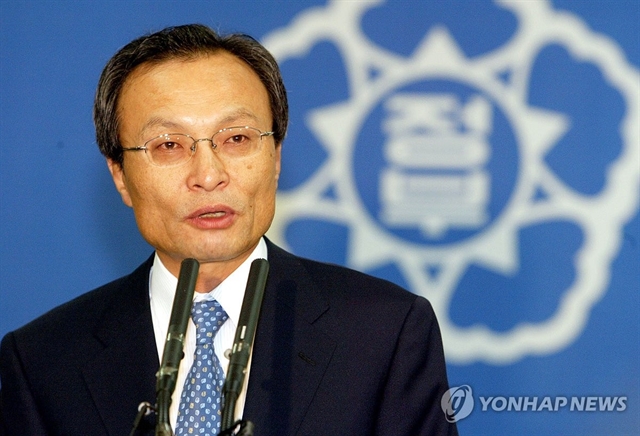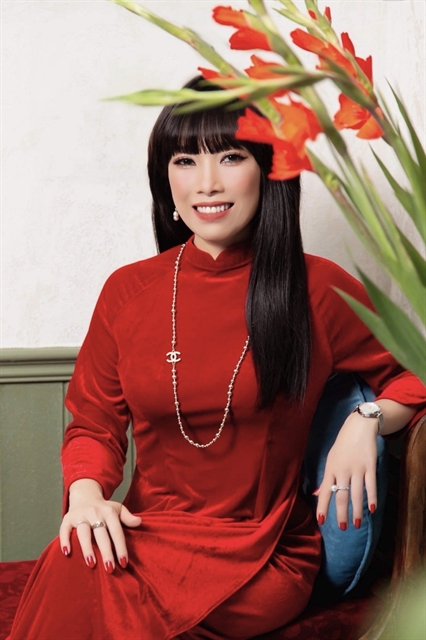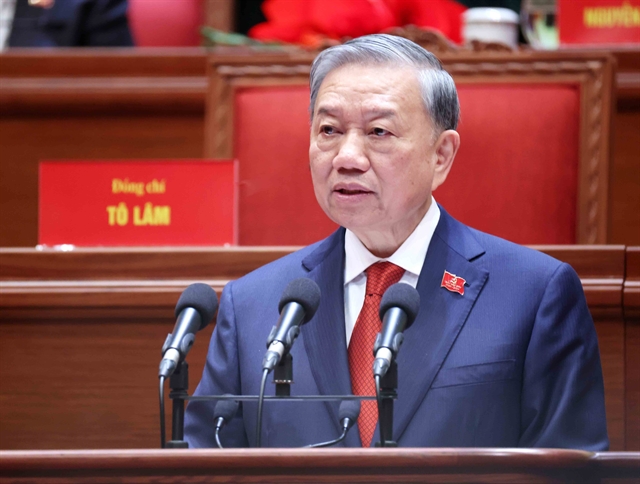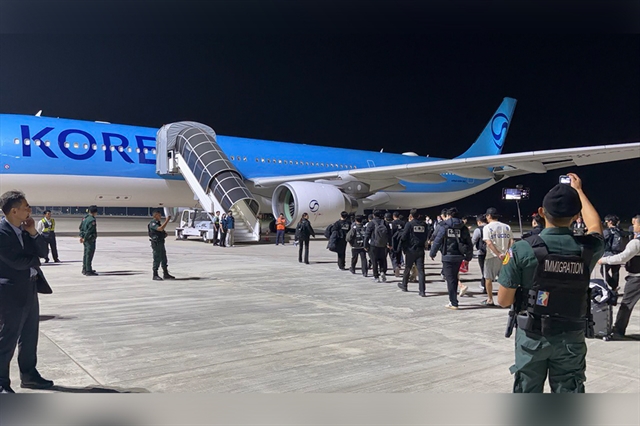 World
World
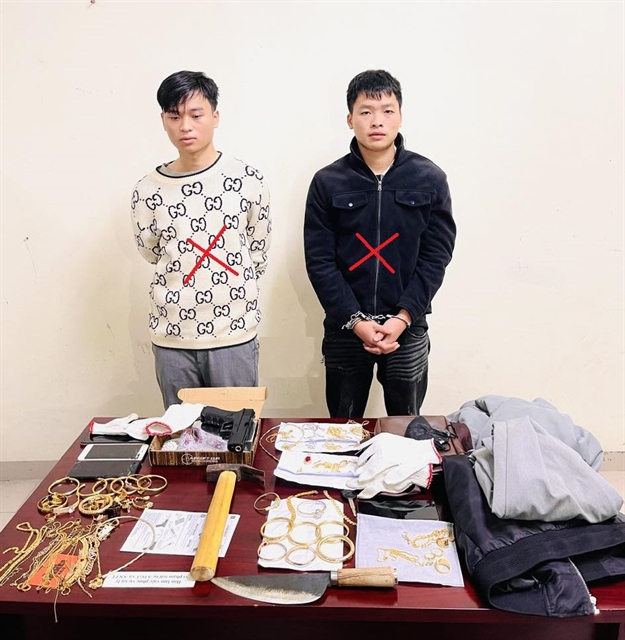
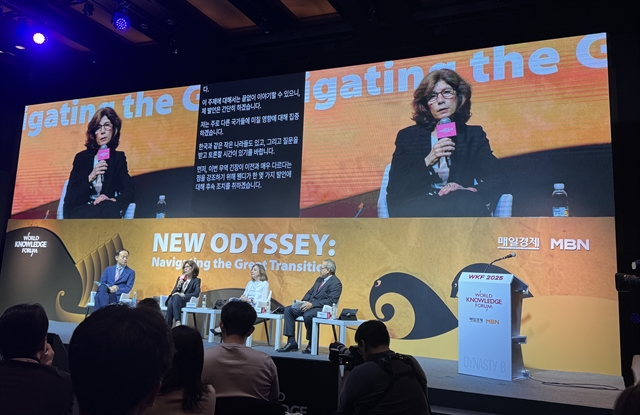 |
| Participants speak at the "Recent US Trade Policy and the Restructuring of the Global Supply Chain" session at the 26th World Knowledge Forum in Seoul. VNS Photo Thu Vân |
Thu Vân
SEOUL — At the 26th World Knowledge Forum, held in Seoul from September 9 to 11, debate heated up over the so‑called 'Trump Round,' a term used to describe the United States’ new trade order.
Professor Pinelopi Goldberg of Yale University, economist William Lee, Chief Economist of the Milken Institute, and Wendy Cutler, Vice President of the Asia Society Policy Institute, exchanged sharp views on US President Donald Trump’s tariff policies at a session titled “Recent US Trade Policy and the Restructuring of the Global Supply Chain.”
Opening the discussion, Wendy Cutler said the difference between Trump’s two terms could not be overstated.
“Number one, he just hit the ground running. Right after the first term, he kind of took his time and a lot of his advisors were arguing about, you know, the best policy going forward. But this time around, he really knew what he wanted to accomplish, frankly and I think he’s got it with warp speed,” she said.
Cutler explained that the first Trump term was largely about remaking the global economic order that had relied on the US to lead, working with other nations to open markets and set goals, standards and norms.
“We’re moving away from that,” she said. “The United States has made it clear we don’t want to be the leader anymore. We want to do what’s right for us. And if that means upsetting other countries, so be it.”
She warned that as a result, other countries may no longer be able to derive the same benefits they once did from the multilateral system.
Pinelopi Goldberg, too, underlined the scale of the shift.
“One lesson from what was announced on April 2 is that if you were very closely tied to the US, you were actually hit harder,” she said.
“A general change we see recently in trade policy is that we have transitioned from a rules‑based system to a power‑based system. And so the US is currently exercising its power. That leaves smaller countries at the mercy of US interests.”
She argued that this situation creates added uncertainty, as governments and businesses alike are unsure how best to respond.
“It is very clear that countries now need to figure out what the best adjustment is, at the national level, at the private sector level, and at the industry level. And we don’t even know what the right response is going to be,” said Goldberg.
For this reason, she suggested that gradual decoupling from the US might be the only sustainable long‑term answer.
“It could be that this strategy is going to change when the President changes,” she admitted. “But it’s very hard to be optimistic about the future.”
Tariffs as a ‘sideshow’
William Lee from the Milken Institute countered with a different perspective. While acknowledging that most economists would insist tariffs “distort production, raise prices for consumers, tax consumers and shut down the gains from trade,” he argued that Trump’s agenda could not be reduced to tariffs alone.
“President Trump wasn’t elected for tariff policy. He was elected because he promised to make America great,” Lee said.
In his view, the core strategy was shrinking government, cutting taxes, rolling back regulations and sending the message that 'the US is open for business.' Tariffs, he stressed, were merely 'a sideshow to the investment programme,' functioning as a protective wall for those who created jobs and invested in America.
“When doctors examine you and find that you have atrial fibrillation, the medicine prescribed is Coumadin, rat poison," said Lee. "It could kill you, but in the right hands, as part of an overall therapy, it can make you better off. Tariffs are like Coumadin.”
He acknowledged, however, that Trump had often pushed the instrument too far, attempting to address 'a thousand targets' with a single tool.
“That causes a tremendous amount of uncertainty,” he said. “But tariffs were never the only tool, remember, smaller government, lower taxes and deregulation were the big ones.”
Lee also emphasised the importance of capital flows, citing Nobel laureate Robert Lucas in explaining why capital frequently moves from poorer to richer countries.
“Capital goes to where the rates of return are the highest, and that’s in the United States, where innovation in AI, Silicon Valley and high‑tech industries drives returns,” he said.
Still, he warned that such flows could overwhelm the financial systems of some countries. Rather than impose capital controls, he said, governments should strengthen their institutions with 'better governance, better lending procedures and more capital requirements.'
Goldberg challenged Lee’s optimism, stressing that tariffs have in fact deepened investor uncertainty.
“The US has long been an attractive destination for capital precisely because it is the land of innovation, where investors could be confident of high returns if their investments were safe,” she said.
“But when tariffs are introduced, that certainty is undermined. Long‑term investments, especially those with large fixed costs, are particularly vulnerable. There is a lot of research showing that in the current environment, it is very questionable whether companies would still want to invest in the US.”
She also referred to the incident at the Georgia plant earlier September, in which US immigration authorities raided a Hyundai–LG battery plant site in Georgia and detained about 475 people, including more than 300 South Korean workers, over alleged visa violations.
Goldberg said that such events would not encourage other countries to invest in the United States, and that if President Trump was trying to make America great today without caring about what happened to Korea or other countries, then his strategy amounted to bringing down the current system.
America First does not mean America alone’
Executive Vice President of the America First Policy Institute and former US Homeland Security Secretary Chad Wolf sought to frame the America First principle as a pragmatic, not isolationist, doctrine, at another session within the Forum.
“America First does not mean America alone,” he said. “It simply means putting citizens’ interests first, which is what every government should do, while still working closely with allies.”
Wolf argued that America First was deeply rooted in the country’s history and would endure beyond any single presidency. He described Trump’s years in office as a period when long‑dormant ideas were put into practice, reshaping domestic policy, foreign affairs and homeland security.
He added that the America First Policy Institute is working to carry forward that legacy, both through policy design and by providing personnel to the Trump administration.
“Whether you like President Trump or you don’t,” Wolf said, “what you would say during 2017 to 2021 was that the policies he advocated helped America both economically and in terms of security. More jobs, more employment, stronger homeland security, those four years were a net positive for Americans.”
Wolf vigorously defended tariffs, calling them a necessary corrective.
“President Trump has spoken about tariffs for decades. There may be some short‑term pain, but the long‑term benefits will outweigh it. This is about righting a wrong,” he said
Wolf dismissed warnings from critics, including many economists, that tariffs would undermine growth and strain alliances.
"While there may be some pain here in the short term, the long-term benefit will outweigh the short-term pain that we feel today," he said. VNS


